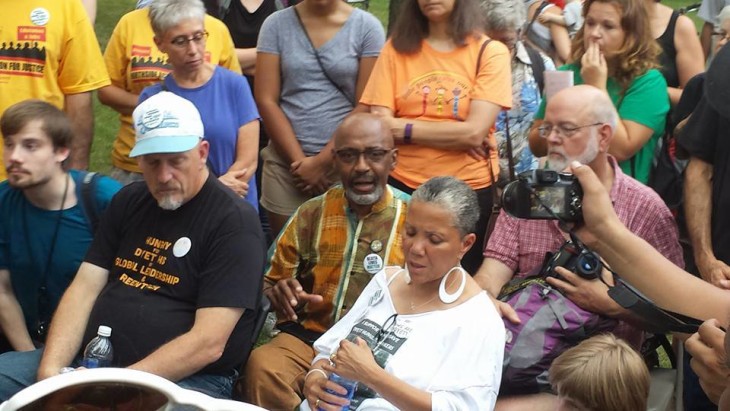By Michelle Gunderson.
We sit under the trees at Dyett High School yet again on Sunday night. The Dyett 12 hunger strikers sit in a tight circle while a crowd of over a hundred of Chicago’s activists listen in. I know almost every face in this crowd. They are people who understand struggle and know what the word solidarity truly means.
It is day 22 of a hunger strike to re-open Dyett High School as an open enrollment school that is community supported and community sustained.
The activists are here to see what the hunger strikers are asking and to have their guidance in how to support them.
Last Thursday Rahm Emanuel, the mayor of Chicago, held a press conference to announce that a compromise had been made. Dyett High School would open as an open enrollment high school with an arts focus and a technology component. To many people this seemed as if the struggle was over. No one wants anyone hurt in this process, and many were hoping that the hunger strike had come to a victorious conclusion.
This was a decision, though, that was made without the hunger strikers or anyone affiliated with the Coalition for the Revitalization of Dyett High School.
As Dr. Robert Jones, one of the hunger strikers stated, “A group of folk I had never seen before were standing up at the Chicago Public Schools office telling us what our children’s school would be like.”
To be fair, no one has ever had a school closing reversed in Chicago. In addition, the hunger strikers were able to ward off the opening of a charter school or a contract school. These are tremendous wins.
But as Jitu Brown, one of the hunger strikers said, “Don’t give us crumbs and tell us it’s a cake.”
The hunger strikers make their decisions collectively, and they are continuing the hunger strike based on demands that include a green technology curriculum, the community choosing the principal, and an elected Local School Council put in place the first year.
If a school is opened that the community wants, it will be a school that the community supports and sustains. There is a maxim that is often quoted: Any decision for the community that is not from the community is not about the community.
So where do the Dyett 12 go from here?
There is a team of negotiators working to form a conclusion that is suitable to the Coalition for the Revitalization of Dyett which includes Jesse Jackson and key individuals from the Chicago Teachers Union. As negotiations carry forward, the Dyett 12 will continue the hunger strike and the external pressure on Rahm Emanuel.
During the first week of the strike the Dyett 12 experienced a media blackout in Chicago. Over the past two weeks there has been an increase of national news coverage including an appearance by Jitu Brown and Jeanette Taylor-Ramann on the Melissa Harris-Perry Show on MSNBC.
As Jitu Brown put it, “We need to keep the pressure on through media sources. Rahm cares most about his donors and his national Democratic image.”
Help keep the pressure on. Share links to articles that fairly address the hunger strike on your social media platforms. Keep calling the mayor’s office at 312 744 3300, letting him know that the eyes and ears of this country are focused on this struggle.
In the end, we owe the hunger strikers a huge debt of gratitude. The dignity and grace with which they decided to carry on will benefit all of us. It would have been so easy to call off the strike and declare a victory last week, but if we let powerful politicians and not our communities have full control of our schools what really would have been won?
In all of our continuing battles to keep our public schools in public hands, we will look to the Dyett 12 that paved this path for us.
Michelle Strater Gunderson is a 28 year teaching veteran who teaches first grade in the Chicago Public Schools. She is a doctoral student at Loyola University in Curriculum and Instruction.
Featured photograph by Kim Goldbaum, used with permission.






Leave a Reply